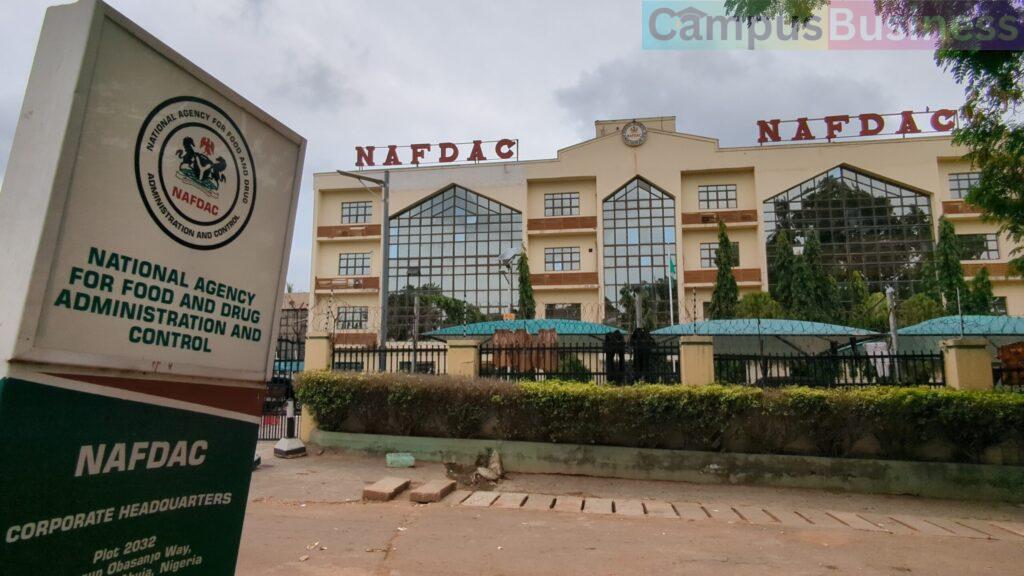Campus Business (October 3, 2024) – Starting a business in the food, drug, or cosmetics sectors in Nigeria comes with the responsibility of obtaining a NAFDAC (National Agency for Food and Drug Administration and Control) registration. This ensures your products meet safety standards, protects your business from legal issues, and fosters consumer trust. Here is a step-by-step guide to help you through the process.

Step 1: Business Registration with CAC
Before beginning the NAFDAC registration process, your business must first be registered with the Corporate Affairs Commission (CAC). This is a mandatory requirement for micro, small, and large-scale businesses. Ensure you have your CAC certificate ready for submission.
Required Documents:
For both micro and small-scale businesses, the following documents must be submitted to NAFDAC:
- CAC Registration Certificate: Proof that your business is a legally recognized entity.
- Site Use Agreement: If you’re leasing your production site.
- Trademark Approval: This ensures that your brand name is legally recognized and protected in Nigeria.
- Fumigation Certificate: Proof that your business premises are fumigated regularly.
- Three Product Labels: Labels of your product that meet NAFDAC’s requirements.
- Medical Fitness Certificates for Production Staff: Certificates proving your staff are healthy, covering essential tests (e.g., stool, sputum, Widal, urine, Hepatitis B).
- Payment Receipts: Proof of payment for the registration process.
Additional Documents for Small-Scale Businesses:
- Standard Operating Procedures (SOPs): This includes detailed procedures for quality assurance, equipment cleaning, packaging material handling, and more.
- Certificates of Analysis: For both raw materials and finished products.
Step 2: Obtain the NAFDAC Registration Form and Guidelines
You can obtain the NAFDAC registration form in two ways:
- Online: Download from the NAFDAC website here.
- Physical Collection: Visit any NAFDAC State Office near you to collect the form.
Step 3: Document Submission
Once you have filled out the form, the next step is to submit all the required documents mentioned above. Along with the documents, submit the following:
- Vetting Sample: A sample of your product for evaluation.
- Completed Application Form: Ensure all fields are filled accurately.
- Fumigation Certificate: A copy of the certification showing your facility has been fumigated.
- Product Labels: Ensure the labels conform to NAFDAC standards, including key details like ingredients, batch number, expiration dates, etc.
Step 4: Payment and Scheduling Facility Inspection
Before making payments, request a payment advice from your NAFDAC desk officer. The amount depends on the product category and registration service being requested. Once you receive the payment advice:
- Make the payment through Remita.
- Submit the receipt of payment to NAFDAC’s Accounts Department.
- Schedule a date for the facility inspection. During this inspection, NAFDAC will assess your premises for Good Manufacturing Practices (GMP) and Good Hygiene Practices (GHP). They will also collect samples for laboratory testing.
Step 5: Labeling and Compliance
Your product labels should meet the following NAFDAC requirements:
- Product Name and Net Weight/Volume: Display prominently.
- Batch Number: Clearly stated.
- Manufacturing and Best-Before Dates: Mandatory on all consumable goods.
- Space for NAFDAC Registration Number: Leave adequate space for the NAFDAC number to be included once approved.
- List of Ingredients and Storage Conditions: For consumer safety and compliance with food and drug regulations.
- Manufacturer’s Details: Full contact information, including address.
Step 6: Facility Inspection and Laboratory Analysis
On your scheduled date, NAFDAC officials will inspect your facility. They will assess your compliance with GMP and GHP standards. If everything is satisfactory, they will take samples for laboratory analysis.
Timeframe for Laboratory Analysis:
- Food Products: 30 days.
- Drug Products: 40 days.
Step 7: Approval and Issuance of NAFDAC Registration Number
If your facility inspection and laboratory results meet NAFDAC standards, your product will be approved. The NAFDAC registration process typically takes around 90 working days for food products and 120 days for drugs.
Once approved, you’ll be notified to collect your NAFDAC Registration Certificate and number. Ensure the registration number is added to your product labels before distributing the products.
Step 8: NAFDAC Registration Fees
The costs associated with NAFDAC registration vary based on the type and number of products you are registering. Here’s a breakdown of the most common fees:
Registration Fees:
- Single Product Registration: ₦15,000
- Product Variants (Per Version): ₦5,000
- 2-5 Products: ₦29,700
- More than 5 Products: ₦103,950
Ancillary Fees:
- Certified True Copy of NAFDAC Documents (Per Page): ₦5,000
- Clinical Trials Fees: (For pharmaceutical products)
- Application Fee: ₦250,000
- Inspection Fee: ₦350,000
Step 9: Compliance and Maintenance
After receiving your NAFDAC certification, it’s important to maintain compliance with all the agency’s regulations. This includes regular facility inspections and updating product labels if required.
What You Should Know About NAFDAC
NAFDAC was established in 1992 following a series of public health issues caused by counterfeit drugs and substandard food products. NAFDAC is responsible for regulating and controlling the manufacture, importation, distribution, and sale of food, drugs, cosmetics, and medical devices in Nigeria.
The registration process is designed to protect consumers and ensure that products meet strict safety and quality standards before they reach the market.
Conclusion
Getting your business NAFDAC registered is a critical step toward ensuring your products are legally compliant and safe for the Nigerian market. By following these steps and maintaining proper documentation, you can navigate the registration process with ease. Be sure to keep track of timelines, fees, and inspection schedules to ensure a smooth process from start to finish.
For more details on NAFDAC’s processes and updates, visit the NAFDAC Website.



Post Comment